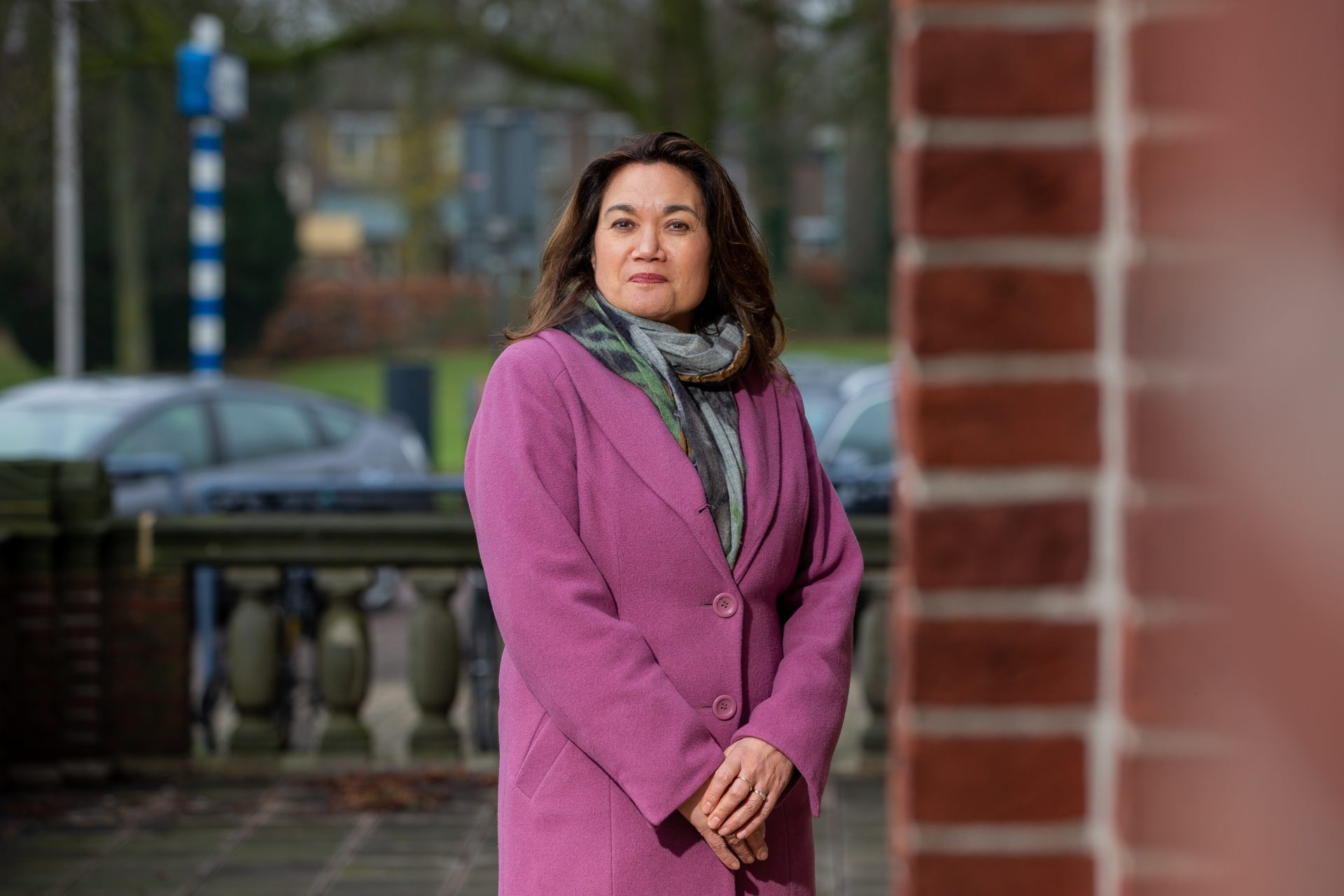Why the ombudswoman is resigning: ‘I feel like I was constantly being sidelined’
-
 Nancy Viellevoye. Photo: David van Haren
Nancy Viellevoye. Photo: David van Haren
Nancy Viellevoye has resigned her employment as the university's ombudswoman. Not because she doesn’t like the job anymore, but because she could not achieve what she wanted to. ‘This organisation has such a strong hierarchy that you only get a say in matters if you have power.’
‘I started here with the idea that I could use my knowledge, skills and experience for the university and its employees and that I could really make a difference in this position.’ Nancy Viellevoye, ombudswoman speaks. ‘But I don’t feel like that is possible as of now.’
That is why she handed in her resignation. On April 18th she will leave Radboud University.
Viellevoye wants to explain which struggles she confronted at her job in a conversation with Vox. The interview takes place on the second floor of the Thomas van Aquinobuilding, where the ombudswoman had plenty of conversations with university employees. The past year she received 111 reports. That is a whole lot, Viellevoye says. Later more about that.
Strong hierarchy
First, she needs to share something else. Maybe, starting immediately, she was too idealistic and ambitious when she became the very first ombudswoman of Radboud University, two and a half years ago. ‘I felt like I had ended up in a position where I would be a full-fledged interlocutor for the executive board and the faculty and managing boards, but because of the strong hierarchy at the university this was not the case.’
Because of her role as lawyer and mediator Viellevoye was used to sit down with people in management. ‘You are called into advice or to fix a certain situation. I expected to have a similar job as ombudswoman, but apparently that is not how it works. That gave me the constant feeling of being sidelined. And that because of this, I could not mean much to all those reporters who came to me.’
‘Employment lawyers, consultants or researchers were flown in all the time, even though there is enough expertise at the university already’
The ombudswoman has an idea why this could be. ‘It’s a new job at the university, resulting from the cao agreements (collective labour agreement). The Radboud University was one of the last ones where an ombudsman was hired.’ What could be the benefit of an ombudsperson has not yet been seen at the university.
External investigations
Due to matters of privacy, Viellevoye can’t give examples of cases in which she had problems. What she can say is that her expertise remained largely unused. ‘When there might be wrongdoing, directors tend to turn to external investigators and then the ombudsperson can barely add to it.’
Such investigations have occured a lot over the past years at Radboud University, among others at the Faculty of Philosophy, Theology and Religion Studies and the Anthropology and Developmental Studies programme. Currently, Bureau Berenschot is investigating a professor of Psychology who has been sending unwanted text messages to a Master’s student for years.
According to Viellevoye, it is a director’s reflex to hire external advisors when there are problems with social safety. ‘Employment lawyers, consultants or researchers were flown in all the time, even though there is enough expertise at the university already. For example at the faculties, at HR and the Internal Audit service.’
In the case of external investigations, Viellevoye explains, the commissioners – often directors or board members – are parties that are interested in a specific outcome. They decide what will be investigated for a part. ‘You can also read this in the reports and recommendations that are being copied.’ There is no such thing as full independence, she argues.
As ombudswoman, she was merely able to come up with ideas about potential research questions. ‘It’s positive that I was involved in the process of exploring internal investigations. But when they do not implement my recommendations, my role becomes tiny. The university has such a strong hierarchy that you only have a say when you have power. If not, then your opinion has a much lower value.’
The involvement of supervisors is usually not looked at during external investigations, Villevoye noticed. ‘Even though I have been wondering about a lot of issues surrounding social security how they could have lasted for so long. Therefore it is important to also take a look at the context in which unwarranted behaviour could come into existence and could continue to happen.’
Learn from the past, is Villemoye’s favourite saying. ‘Not to punish people in their work, but to learn why things happened, in order to prevent them in the future.’
Too much work
Viellevoye ran into other problems as well, including the number of reports she got. In 2023, there were a total of 111 reports, in the previous year there were 95. Most cases reported disputes with supervisors or between employees. She also saw a lot of frustration from people who were promised a promotion they did not get.
It is a good thing that people know how to find her, Villevoye says, though most of these reports should be resolved by HR. ‘Often, I’m told that HR could not help the individual or that people feel that the HR employees are not independent. There are also a lot of people coming to me because their supervisors do not take responsibility or show the vigour to change things, which causes the problems to linger.’
As a consequence of this, the ombudswoman has often felt overburdened. She only worked three days for the university, even though the amount of work demanded four. ‘I did this with love and happiness, but at some point it became to much,’ Viellevoye says.
‘I remained busy with advising and mediating, but I wanted to make a difference on the bigger problems’
‘On top of that I remained busy with advising and mediating. Those are things that I’ve been doing all my life. As an ombudswoman, I wanted to make a difference in the bigger problems. But I could not look at the university from above as much as I wanted to, to detect patterns of social insecurity.’
The ombudswoman does not see this changing at the university any time soon. Villevoye expects new problems if the ombudsperson were to get a more transcendent role. Most of the individual cases would then have to be resolved by HR and supervisors. ‘That demands a bigger capacity and expertise at HR and more trust in supervisors. As long as that is not the case, there will remain a rise in demands for independent, professional advice and mediating.’
Viellevoye is glad that there will soon be a central hotline for undesirable behaviour, a spearhead of the new plan of action. ‘However, the reports will have to be handled by someone. There will have to be a place victims can go to.’
‘If that is not the ombudsperson, they will go to the unions. They are aimed at escalation, whereas an ombudsperson always tries to de-escalate in the interest of the organization.’
Cumbersome organisation
Whether she’s been disillusioned? ‘No, improvements have been made or started with, for example by the team of Social Safety. I, myself, received a lot of appreciation from the people I helped with advice and mediation. But there is still a lot that needs to be done. I had hoped that my function as ombudsperson would be embedded more into the organisation and that more people could have appreciated it.’
Altogether, she got to know the university from a completely different perspective over the past two and a half years. ‘It’s worth mentioning that the university is completely different from the inside than it appears from the outside. I did not expect this to be such a cumbersome organisation, where things work in a certain way because they always have been.’
Succession
Nancy Viellevoye says she would love to help her successor get used to the job. ‘I resigned at the end of January and now it’s up to the executive board to do something with it. The 18th of April is my last day, so it would have to happen fast. I’ve heard that they are working on it.’
What will happen to the reports that Viellevoye received in the past two years? According to the AVG, they can only be kept for three years. Viellevoye says that she intends to hand down her administration to her successor. What happens afterwards is not up to her anymore.
Her hope stems from the increasing transparency when decisions are made, even at the level of specific cases. ‘That’s positive,’ she adds.
After her resignation, she will go back to working full-time at her own mediation business. She deliberately kept it throughout her employment at Radboud University, in order to ensure her independence. What’s next? ‘I’ll see what crosses my path,’ Viellevoye says. ‘I hope I’ll be able to get a job as ombudswoman again sometime. If embedded well in the organisation, you can achieve a lot – it’s a great job.’




